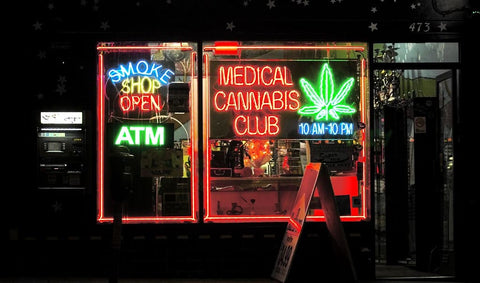In this article, we are talking about the boom in the Catalan capital, following the significant appearance of many cannabic associations since 2013, better known by the name of ” Cannabis Socials Clubs ». The latter thought they had paved the way for a certain form of stable and viable regulation, but a court decision announcing their closure, was received as a thunderclap last July within the Mediterranean metropolis.

Barcelona is a very attractive tourist destination for travelers from all over the globe. It is true that it is a city where it is very pleasant to stay, thanks to the beauty of its historic center, with the famous Sagrada Familia de Gaudi, the market with a thousand colors of the Rambla, a well -appointed port area, its Very numerous and sumptuous shops of all kinds, diversity and the exoticism of its delicious restaurants, hotels, or the richness of the nightlife it can offer you, all in an ideal Mediterranean climate.

It must also be recognized that it has become a place to discovery of first choice, for all fans passionate about cannabis in recent years. With over 200 cannabis social clubs in the heart of the Catalan capital, you are spoiled for choice. The diversity of products presented is such that you will easily find shoe at your foot.
It is quite possible to meet products with a quality standard close to those found in California today. The Spaniards now have a long experience in the culture of cannabis, their level of knowledge and requirement are therefore logically high. You no longer need to go to Los Angeles to consume Californian products “Top Shelfs” (superior quality), Barcelona will surely satisfy all your desires.
We can even say that the Barcelona cannabic scene has largely exceeded all the charm of the beautiful Amsterdam in this sense. During the Spannabis, 1st cannabic salon in Europe, the many CSCs in Barcelona organize many “pop-up” events (short-lived animations), throughout the city. This generates an important dynamic on the part of the cannabic community within the city.
Most of these cannabic associations were formed from 2013, their number has only increased sharply since that date. Their success and notoriety are such that many of them have established close links with recognized actors in the American cannabis industry. The very famous brand “Cookies” by rapper Berner, from San Francisco, also took up residence in Barcelona. “FAM cookies” recently decided to open a clothing store there, as well as a “cannabis social club” with the image of the brand. This is anything but chance, because it is a strategic establishment in a European city where it is rare, tolerance for the cannabis is tall. It is therefore an interesting position for this large Californian group, within the European cannabis industry.

A glimmer of hope bringing them a momentum of serenity appeared in 2016, because the municipal council of Barcelona had succeeded in obtaining a regulations of town planning integrating the regulation of the various CSC from the city. This contained certain legal conditions to be complied with concerning the establishment as well as the proper functioning of these establishments.
Unfortunately, a dramatic stroke occurred last July, because the Supreme Court of Catalonia has simply decided to cancel this court decision, explaining that no municipality is competent to give themselves the right to create a regulation of this nature.
They argue that such a decision can be adopted, if and only if it comes directly from the central government of Madrid. The town hall of Barcelona had appealed in cassation to the Spanish Supreme Court, which rejected the latter last April. This town planning regulation was the only legal protection available to the cannabic clubs of this municipality.
This sad news therefore forced the city of Barcelona to send a registered letter to each association by transmitting the modification of their operating rules. The shower was frozen for the leaders of the various Barcelona structures, reading this new regulation. The words are clear, they will no longer be able to promote, cultivate, facilitate or provide cannabis to their members. From now on, this type of establishment has exclusively the role or the possibility of organizing seminars, meetings to provide information to its members. But nothing more on the program, more clearly, it is a mechanism of neutralization of these structures. To top it off, they are announced that inspections will be carried out in number, in order to verify that each association respects the law.
For the time being, Catfac (the Federation of Cannabis Social Clubs in Catalonia) has already scheduled a meeting with the municipality of Barcelona in September, in order to tackle this subject in depth and try to find a way out which would be other than the massive closure of these establishments.
On the other hand, it would seem that Barcelona as its periphery are experiencing a strong resurgence of crime over the past 5 years, with the presence of several national and international criminal organizations. Serious facts such as settling of accounts or theft by violence with violence, are facts which are becoming more and more frequent in the Catalan capital and its suburbs.
In addition, a new phenomenon now appears in neighborhoods like Sant Roc de Badalona or at the Mina of Sant Adria de Besos, because some criminal bands are trying more and more to put pressure on certain inhabitants by establishing a climate of terror in Their neighborhood, in order to drive them out of their accommodation. All this in order to recover these, to install illegal cannabis cultures there and thus increase their economic activity. It seems that these organizations no longer have limits, where will this criminal ascent stop?
By being fully objective, what is the solution to this? The return of the black market in the streets and parks of Barcelona, with its share of obscurantism and exhaustive crime?
This does not seem frankly to be a viable solution in terms of health as well as public security. Once again, the only pragmatic solution is simply the regulation for the good of all, accompanied by a social project at the height supported by the political world, in order to reorganize this faulty societal part currently in this Spanish metropolis.




